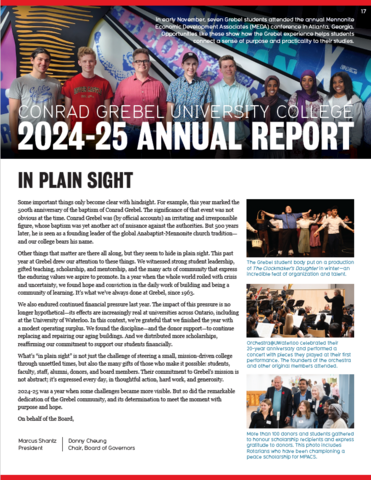
Grebel Annual Report
In Plain Sight
Conrad Grebel University College's 2024 - 2025 Annual Report
Some important things only become clear with hindsight. For example, this year marked the 500th anniversary of the baptism of Conrad Grebel. The significance of that event was not obvious at the time. Conrad Grebel was (by official accounts) an irritating and irresponsible figure, whose baptism was yet another act of nuisance against the authorities. But 500 years later, he is seen as a founding leader of the global Anabaptist-Mennonite church tradition—and our college bears his name.
Other things that matter are there all along, but they seem to hide in plain sight. This past year at Grebel drew our attention to these things. We witnessed strong student leadership, gifted teaching, scholarship, and mentorship, and the many acts of community that express the enduring values we aspire to promote. In a year when the whole world roiled with crisis and uncertainty, we found hope and conviction in the daily work of building and being a community of learning. It’s what we’ve always done at Grebel, since 1963.
We also endured continued financial pressure last year. The impact of this pressure is no longer hypothetical—its effects are increasingly real at universities across Ontario, including at the University of Waterloo. In this context, we’re grateful that we finished the year with a modest operating surplus. We found the discipline—and the donor support—to continue replacing and repairing our aging buildings. And we distributed more scholarships, reaffirming our commitment to support our students financially.
What’s “in plain sight” is not just the challenge of steering a small, mission-driven college through unsettled times, but also the many gifts of those who make it possible: students, faculty, staff, alumni, donors, and board members. Their commitment to Grebel’s mission is not abstract; it’s expressed every day, in thoughtful action, hard work, and generosity.
2024-25 was a year when some challenges became more visible. But so did the remarkable dedication of the Grebel community, and its determination to meet the moment with purpose and hope.
On behalf of the Board,
Marcus Shantz
President
Donny Cheung
Chair, Board of Governors
Academic Highlights
Grebel employed 15 full-time and two definite-term faculty, along with 31 adjunct instructors. Together, they taught 175 courses, including five new ones, to thousands of UWaterloo students. Faculty conversations frequently focused on DEI and the challenges of AI. Grebel faculty illustrated the breadth of their scholarship through public lectures, panels, book launches, concerts, faculty forums, and conferences. They published books, chapters, articles, compositions, and delivered workshops and presentations.
To celebrate 500 years of Anabaptism, Karl Koop presented the Bechtel Lecture on “Anabaptist Beginnings and the stories we tell” and the Institute of Anabaptist-Mennonite Studies offered a service of music, reading, and reflection to mark the anniversary. Leonard Friesen offered two public lectures on “Mennonites in Imperial Russian and Soviet History.” MTS presented Bonhoeffer: Cell 92, a cinematic theatre production. Partnered with the UW Research Institute for Aging, the Spirituality and Aging program organized monthly webinars and hosted the annual seminar featuring Mark Roberts speaking on the “Third third of life.” The Milton Good Library worked with volunteers to digitize The
Canadian Mennonite (1953-1971) and migrated the Mennonite Archives of Ontario website. MAO opened a new exhibit, What They Carried: The Archives of Russlaender Mennonite Immigrants. The Conrad Grebel Review published its final two issues in January 2025.
The Music Department revised its curriculum to be more accessible and advance decolonization, and they introduced three new specializations: Intensive Music, Performance, and Composition. The program graduated 10 majors and 18 minors. In addition to hosting 14 Noon Hour Concerts, Music organized 18 ensemble concerts, including the 20th anniversary concert of the Orchestra@UWaterloo. 543 UWaterloo students participated in ensembles (335 for credit). Choral Day attracted 230 local high school students for workshops and concerts.
The number of PACS majors (13) and minors (14) declined slightly, while course enrolment held steady and recruitment showed promise. PACS cross-listed more courses, while faculty collaborated with UWaterloo colleagues and departments. One PACS and four MPACS students participated in internships, a marked decrease from last year. Teena Faust won first place in the C. Henry Smith Peace Oratorical Contest, and faculty member Eric Lepp offered the Eby Lecture on “Paint as Protest.” PACS hosted a Peace and Justice Day for high school students.
The Master of Theological Studies program put much effort into recruitment, with positive results. A third year of sharing enrolment in two online courses with CMU continued, this year with a course on Minor Prophets. Nine students participated in Supervised Experience in Ministry placements in churches, nursing homes, the University of Toronto, and Mennonite Church Eastern Canada. The program also continued work on the seven-year review process and offered a course on Theologies of the Global South with Sessional Instructor Pablo Kim.

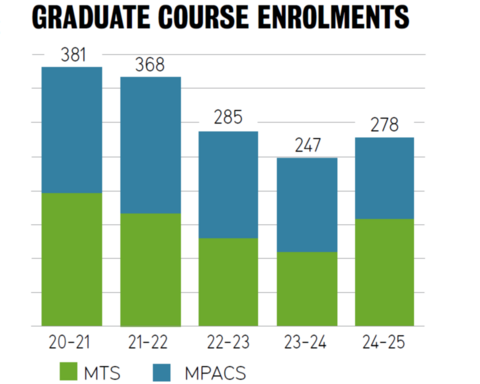
UNDERGRADUATE TEACHING
Grebel had 3909 individual undergraduate course enrolments from students across all faculties at UWaterloo. This five-year low is on par with 2019-2020 and within normal fluctuations.
GRADUATE STUDIES
Peace and Conflict Studies and Theological Studies admitted 13 and 21 new master’s students, respectively. Course enrolments rebounded slightly compared to last year, with a total of 32 MPACS and 32 MTS students in the program in the fall.
CONFLICT MANAGEMENT CERTIFICATE
Continuing education workshops saw high demand this year, as the Conflict Management Certificate program celebrated its 25th anniversary. Program profits exceeded anticipated revenue by more than 300 percent and a review process and software upgrade began.
Kindred Credit Union Centre for Peace Advancement (CPA)
The CPA celebrated its 10th anniversary, launched a Certificate Program with the Centre for Community-Based Research, and supported 87 practitioners, entrepreneurs, and researchers and 19 students. Local Futures, a Peace Incubator start-up, received $900,000 in government funding, while two new ventures joined and $296,000 in external support was leveraged. Even with a hiatus, the Grebel Gallery presented four exhibits.
Student Services
Student Services set the tone for the year with an Opening Celebration themed around the idea of planting seeds. The on-site All-Grebel Retreat featured a “Choose Your Own
Adventure” afternoon that brought students, faculty, and administrators together for informal relationship building. Led by enthusiastic and conscientious student leaders, the year unfolded with many planned activities like talent shows, mocktails, an “Is It Cake?” challenge, leaf jumping, the Roommate Challenge, square dancing, and fort-building, and other initiatives run by student groups. Students volunteered on a Mennonite Disaster Service trip to Mississippi, sold cream buns at the Mennonite Relief Sale, hosted a car wash, and packed hygiene kits for Mennonite Central Committee.
With a full residence and apartments, Grebel welcomed 259 residents from all UWaterloo faculties. 105 students served in formal leadership roles—a number that continues to grow. In a 60% monetary increase over last year, 143 residence students received $252,832 in awards that recognize leadership, achievement, and need. Student Services equipped student leaders with DEI training and first-response resources while forging relationships with campus partners for complicated situations. Speakers at Community Supper – many Grebel alumni—helped to strengthen Grebel’s culture of equity, diversity and inclusion. Grebel’s faith composition was 21% Mennonite, 25% Protestant, 19% Evangelical, 7% Catholic, and 5% other religions, and 31% no faith tradition—and reflective of Canadian demographics. International and American students made up 7% of the student body, including two refugee students who are sponsored by Grebel students. The Chapel program emphasized student involvement and saw strong participation. Along with MTS, the Chapel Committee hosted a Public, Intentional, Explicit Day celebrating Grebel’s 2SLGBTQIA+ members.
A major undertaking this year was the student-run musical The Clockmaker’s Daughter, involving 80 students. The Inter-College Cup, run with the other University Colleges on campus, was built on comraderie, energy, and friendly competition.
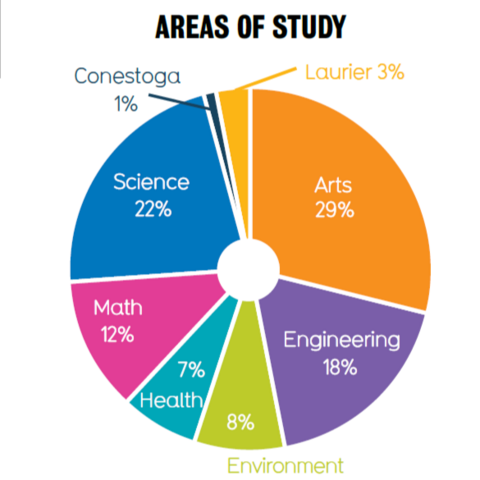
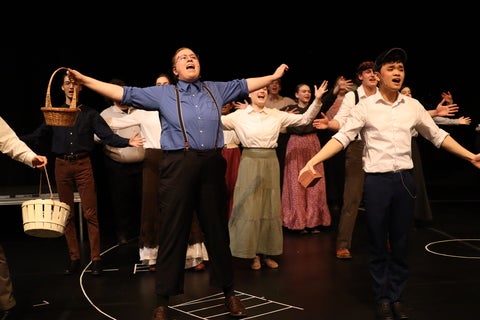
The Grebel student body put on a production of 'The Clockmaker's Daughter'—an incredible feat of organization and talent.
143 of whom were residents at Grebel.
$155,381 came from external sources, $68,825 came from internal sources, $352,104 came from endowment earnings.

Undergraduates of 2025
Operations
Much of the year was spent planning for the residence renewal project, including a feasibility study (which found window replacement would not significantly reduce GHG emissions), the convening of a Building Advisory Committee, design work with Martin Simmons Sweers (the original residence architects), and hiring Nith Valley Construction. Phase 1 of the $4 million project began in April. It includes renovating four student washrooms and replacing the domestic boiler with heat pump hot water heaters.
The multi-zone HVAC unit upgrade in the academic building was completed in April. This heat pump and energy recovery ventilator have already reduced the College’s natural gas usage and carbon emissions. Other projects included replacing the leaking academic wing roof and attending to plumbing and hot water radiator heating issues in the residence building.
The Anti-Racism, Belonging, Inclusion, Diversity, Equity working group commissioned a survey and shared findings and recommendations as a first step for greater inclusion and belonging at Grebel.
Finance
The College ended the year with a modest Operating Fund surplus of just over $110,000. This welcome news is the result of careful effort across all departments to manage resources, during what continues to be a difficult funding environment.
The Operating Fund tracks Grebel’s day-to-day business, and does not include major repair and maintenance projects or building amortization. Last year, we completed the replacement of our 50 year-old HVAC system in the academic wing, installed a new roof, and began early stage work on our residence renewal project. With these expenses factored in, our consolidated deficit was $737,703. Generous donor support has made it possible to be good stewards of our aging buildings.
Strong endowment earnings and donor support enabled us to continue investing in our students through student awards. A total of $576,000 was distributed in scholarships and bursaries—a 14% increase over the previous year.
Advancement
Grebel was built with the vision and support of generous donors. The Grebel community continued to benefit from that legacy. Through gifts, pledges, workplace matches, and bequests, alumni and donors provide essential support for endowments, scholarships, and capital projects. Donor support remained steadfast again this fiscal year, with an 81% donor retention rate. The Grebel Fund goal was met, 80 new donors gave generously, and alumni made up 61 percent of the donor base.
By April 30, 2025, the Windows to the Future capital campaign had secured $3.4 million in gifts and pledges, with $1,223,419 donated in the fiscal year. This project includes critical upgrades to air handling systems, washrooms, and plumbing infrastructure, enhancing the spaces where students spend so much time.
Student scholarship support continued from established partners like Rotary Clubs and Mennonite Disaster Service, with new contributions from Mersynergy Foundation and Kelowna Mennonite Church. Student financial aid rose by 14 percent, and alumni engagement deepened with good participation at nine events, including an Alumni Community Supper. Larry Cornies received the 2024 Distinguished Alumni Service Award and 17 alumni returned to speak at Community Suppers.
With $2,226,985 raised this year and over $12 million at year end in the endowment portfolio, Grebel’s financial position is strong and grounded in resolute generosity from the Grebel community.

Grebel received the "Greatest GHG Reduction Award" from Sustainable Waterloo Region following heat pump renovations in the academic wing, reducing greenhouse gas emissions from 404 tons Co2 to 304 tons. Mimi Browne, Devon Grainger, and Fred Martin accepted the award on behalf of Grebel.
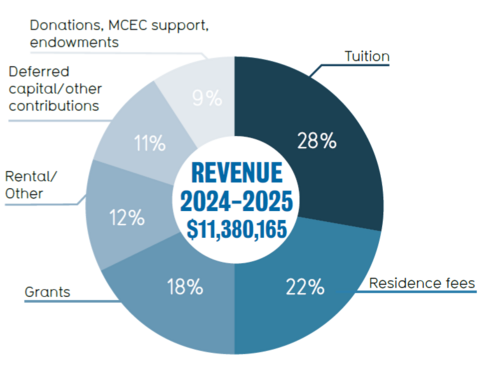
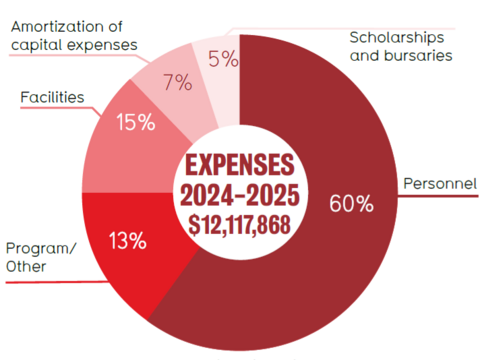
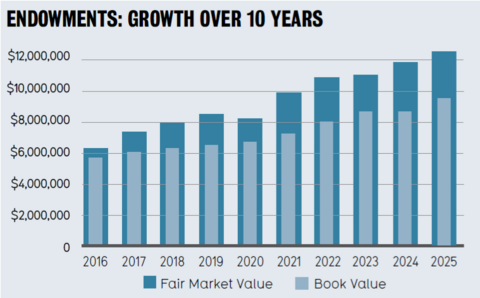
Combined with Grebel Fund donations totalling $385,361, overall donations and pledges for the year reached $2,226,985.
Alumni made up 61 percent of the donor base this fiscal year.
Thank you to our donors for your steadfast support as you make a lasting impact at the College.

More than 100 donors and students gathered to honour scholarship recipients and express gratitude to donors. This photo includes Rotarians who have been championing a peace scholarship for MPACS.
